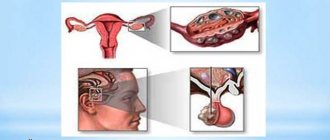Causes of thrush
The development of thrush can be preceded by various factors. Most often, the development of candidiasis can be influenced by such reasons as:
- chronic infections;
- pregnancy;
- diabetes;
- sexually transmitted diseases;
- long-term use of antibacterial drugs;
- taking oral contraception;
- chronic inflammatory diseases.
Weak immunity, changes in hormonal levels, allergic reactions (even to washing powder and pads) can also cause thrush. Having seen the first manifestations, you should not postpone your visit to the doctor and endure, especially if you no longer have the strength to be able to.
Menstrual cycle
Candida is present in the body of almost every woman. If the immune system is at a high level, then the growth of the fungus is inhibited both by the immune cells themselves and by other microorganisms that are part of the microflora of the mucous membranes. The decline in the protective functions of the body and the violation of microflora parameters determine the transition of flex to the list of pathogenic microorganisms. If we consider the relationship between thrush and menstruation, it is worth immediately noting that menstruation cannot cause the active growth of fungal colonies, but as a provoking factor it is very significant.
The fact is that the leakage of menstrual blood creates a favorable environment for the development of fungal disease. Menstruation causes changes in hormonal levels, which in turn provokes an imbalance in the body's hormonal balance. In the presence of weakened immunity, this can activate the development of Candida.
Symptoms of thrush
The presence of thrush can be a cause of menstrual delay, but first of all you need to find out what the symptoms of the disease are, so as not to confuse it with others:
- curd-like discharge appears from the vagina;
- inflammation and redness occur in the area of the external genital organs;
- the woman has persistent itching, including the inside of the vagina;
- swelling appears on the external genitalia.
In addition to this manifestation of the disease, even before the delay, pain is observed during urination, as well as during sex. Depending on certain characteristics of the female body, the manifestations of the disease may have different severity, which also needs to be taken into account.
In this case, you need to immediately go to the doctor, because perhaps in fact the diagnosis is completely different. Even if your suspicions regarding candidiasis turn out to be correct, only a doctor, based on tests, will allow you to choose the ideal treatment that will allow you to cope with the disease and avoid relapse.
Can thrush affect the regularity/length of menstruation?
The connection between thrush and menstruation, as well as the parameters of the menstrual cycle, has not yet been established. If the disease is treated in a timely manner, the woman may feel only mild discomfort, but the fungus can affect other organs. If the body is affected by the mycelium of the fungus, then the sensations that a woman experiences during menstruation may differ from usual. In particular, candidiasis causes dysfunction of the ovaries, and also causes adhesions in the fallopian tubes, so that in the chronic form of the disease and extensive damage to the body, menstruation may be more painful.
If thrush is in a chronic stage, then changes in the vaginal microflora during menstruation cause another exacerbation of the disease. And constant discomfort guarantees a nervous state, sleep disturbances and deterioration in well-being. Features of the development of thrush during menstruation
- Burning when urinating;
- Increased vaginal discharge;
- Increased pain in the abdomen, lower back, etc.;
- Changes in the menstrual cycle - menstruation itself becomes longer;
- Itching that cannot be relieved with local medications;
- Painful sensations during sexual intercourse - this symptom persists after menstruation.
Delay in thrush
Most women worry about whether there is a delay in menstruation due to thrush? In fact, menstruation may well not begin due to the presence of candidiasis. First of all, the reason for the delay in menstruation is that the infection itself becomes a malfunction in the functioning of the entire body. Since thrush is preceded by strong experiences, stress, a decrease in the functioning of the immune system and inflammatory processes. Such reasons can cause a delay in the menstrual cycle in women.
If thrush is not treated for a month or more, then candidiasis takes on an aggressive form. Many women also, without completing treatment for the disease, stop taking medications, as a result of which the symptoms may go away, but the disease will remain in the body. This attitude can cause the spread of a chronic inflammatory process, which can occur approximately several times a year. This may also be the reason why your periods are not coming.
In addition, candidiasis is a sign of hormonal imbalance, which also affects your periods. In fact, there can be a huge number of reasons that provoke the growth of fungus (from colds to diabetes); during this period, a delay is quite likely. It is also impossible to say unequivocally that there may be a delay due to thrush, since this disease does not in any way affect the functioning of the ovaries.
However, it is candidiasis that indicates the presence of any disturbances in the proper functioning of the body, and also indicates its weakness. For this reason, a delay after thrush or before its onset is quite possible. However, you should not try to determine the cause of the pathology, much less self-medicate; you may not be able to guess with the diagnosis what will cause the pathologies in the body.
In other cases, thrush and retention occur after the disease is completely cured. In this case, the cause of the delay turns out to be a consequence of taking medications that can affect the body. It should be noted that a delay with existing thrush may indicate pregnancy.
If you notice the first signs of the disease, which coincide with a delay in menstruation, then it is likely that you are pregnant. In this case, it is unacceptable to take medications without consulting a doctor. Many antifungal agents are highly toxic, which can negatively affect the development of the child and cause birth defects.
Factors of increased attention
Thrush should be treated actively after the end of the critical days. As already mentioned, suppositories and vaginal tablets should not be used. But it is important to remember that candidiasis is a dangerous disease.
https://youtu.be/FVLwZ8RjJLo
And special attention should be paid to the following manifestations:
- Long-term course of the disease is more than 7-10 days, when the itching and burning do not end;
- Symptoms and negative feelings after taking medications not only do not disappear, but new manifestations are added to them;
- There is discharge of pus and blood after menstruation;
- Signs have become more complex - nausea, vomiting, chills, increased body temperature;
- Frequent recurrence of the disease - 3-4 times a year or more often;
- Recurrent manifestations after a 3-month period from the date of completion of treatment.
These manifestations are not only a cause for concern, but also a reason for prompt consultation with a specialist.
Treatment of thrush
If you have thrush, your period is delayed in most cases, so it is necessary to start proper, timely treatment. Drugs for candidiasis should be prescribed only by the attending physician, based on the test data obtained. Specialists must conduct all the required research, only then will they prescribe the optimal treatment that will suit you.
If you have the first symptoms of thrush, and it is not possible to go to the doctor in the near future, then it is recommended to adhere to certain rules before visiting the doctor.
Simple tips include the following:
- it is necessary to wash regularly. It is best to use warm water for these purposes, in which baking soda has previously been diluted (this will remove itching) or a furatsilin tablet. It is also recommended to use a decoction of string or chamomile for washing. Douching in this case is strictly prohibited;
- you should not have sex until you completely get rid of thrush;
- it is necessary to correctly adjust the treatment, and also completely abandon yeast bread, spicy seasonings and sweets, replacing them with cereals, fruits and vegetables. Fermented milk products and dairy products are allowed in food.
Treatment of thrush, especially if it is accompanied by a delay, which may indicate the onset of conception, is an issue that must be resolved exclusively by a gynecologist. In this case, it is absolutely not permissible to self-medicate, as this can harm the normal development of the child.
What to do if thrush appears every month before your period?
This process is abnormal, even despite hormonal changes and other factors. This indicates the presence of problems in the female body. Therefore, it is advisable to consult a doctor and get examined. He will understand why the problem occurs and plan the best solutions.
The doctor will explain whether the chronic phase can begin under certain conditions and without treatment. This must not be allowed. It is important to start high-quality and timely treatment. It is worth following all the doctor’s instructions for this. You can also learn from your doctor how to relieve itching due to thrush during menstruation. There is no need to make any independent attempts here. They can lead to serious complications.
If candidiasis always occurs before your period, you should definitely visit a doctor. A thorough examination and diagnosis will allow you to identify the main causes and find ways to properly resolve the problem. Why does candidiasis occur after menstruation? This question also interests many. It usually manifests itself due to weakening of the body. Therefore, he needs to be treated and monitor his health.
Source
Conclusion
If a woman has been diagnosed with thrush, then treatment should also be prescribed to her sexual partner. If a woman has been diagnosed with candidiasis and treatment for it has been started, she should definitely notify her man with whom she has sexual contact so that he also undergoes treatment. If you don’t do this, you can later re-infect the disease from your partner. That is why a woman and a man must do everything that was indicated by the doctor in order to prevent a fungal infection from breaking into their lives again.
Doctors' recommendations
Often candidiasis during menstrual periods is caused by a weakened immune system. To strengthen it and prevent further development of the disease, doctors recommend adding fish, nuts, honey, a variety of fruits and dried fruits to your diet. It is also best to replace regular store-bought teas with herbal counterparts.
To prevent the disease, follow these tips:
- use special cosmetics for intimate hygiene;
- Avoid wearing tight underwear made of synthetic materials, in particular thongs;
- reduce your intake of carbohydrate foods;
- Take probiotic supplements a week before your expected period to fill your body with beneficial bacteria that will inhibit the development of yeast.
If your period is delayed after treatment for thrush, it means that the medications you are taking have affected your hormonal levels. In this case, as soon as the effect of the medications wears off, the cycle should resume. Make sure the delay is not related to pregnancy.
https://youtu.be/NIVOjVTY30k











